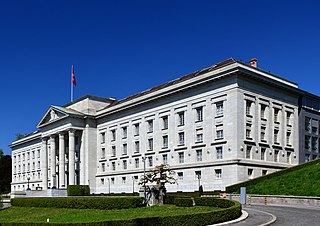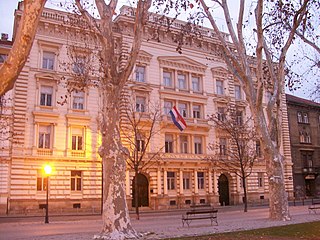Military justice is the legal system that governs the conduct of the active-duty personnel of the armed forces of a country. In some nation-states, civil law and military law are distinct bodies of law, which respectively govern the conduct of civil society and the conduct of the armed forces; each body of law has specific judicial procedures to enforce the law. Among the legal questions unique to a system of military justice are the practical preservation of good order and discipline, command responsibility, the legality of orders, war-time observation of the code of conduct, and matters of legal precedence concerning civil or military jurisdiction over the civil offenses and the criminal offenses committed by active-duty military personnel.
The judiciary of Germany is the system of courts that interprets and applies the law in Germany.

The Judicial Yuan is the judicial branch of the government of the Republic of China on Taiwan. It runs a Constitutional Court and oversees all systems of courts of Taiwan, including ordinary courts like the supreme court, high courts, district courts as well as special courts like administrative courts and disciplinary courts. By Taiwanese law, the Judicial Yuan holds the following powers:

The Federal Court of Justice is the highest court of civil and criminal jurisdiction in Germany. Its primary responsibility is the final appellate review of decisions by lower courts for errors of law. While, legally, decisions by the Federal Court of Justice are only binding with respect to the individual case in which they enter, de facto the court's interpretation of the law is followed by lower courts with almost no exception. Decisions handed down by the Federal Court of Justice can only be vacated by the Federal Constitutional Court for violating a provision of the German constitution, the Basic Law.

The Federal Supreme Court of Switzerland is the supreme court of the Swiss Confederation and at the head of the Swiss judiciary.

In France, career judges are considered civil servants exercising one of the sovereign powers of the state, so French citizens are eligible for judgeship, but not citizens of the other EU countries. France's independent court system enjoys special statutory protection from the executive branch. Procedures for the appointment, promotion, and removal of judges vary depending on whether it is for the ordinary or administrative stream. Judicial appointments in the judicial stream must be approved by a special panel, the High Council of the Judiciary. Once appointed, career judges serve for life and cannot be removed without specific disciplinary proceedings conducted before the Council with due process.

Under the Constitution of Finland, everyone is entitled to have their case heard by a court or an authority appropriately and without undue delay. This is achieved through the judicial system of Finland.

The judicial system of Turkey is defined by Articles 138 to 160 of the Constitution of Turkey.

The Court of Cassation of Belgium is the supreme court of the Belgian judiciary. The court is composed of thirty judges with life tenure who are nominated by the High Council of Justice of Belgium and appointed by the Belgian federal government. The court handles cases in the two main languages of Belgium, Dutch and French, and provides certain facilities for cases in German. The court is assisted in its work by a public prosecutor's office and a bar association, which both function separately from other structures. The duty of the public prosecutor's office is to provide advisory opinions to the court on how the law ought to be interpreted and applied. The attorneys of the court's bar association assist litigants in proceedings before the court; in certain cases, their assistance is mandatory.

A supreme court is the highest court within the hierarchy of courts in most legal jurisdictions. Other descriptions for such courts include court of last resort, apex court, and highcourt of appeal. Broadly speaking, the decisions of a supreme court are not subject to further review by any other court. Supreme courts typically function primarily as appellate courts, hearing appeals from decisions of lower trial courts, or from intermediate-level appellate courts.

The judiciary of Pakistan is a hierarchical system with two classes of courts: the superior judiciary and the subordinate judiciary. The superior judiciary is composed of the Supreme Court of Pakistan, the Federal Shariat Court and five High Courts, with the Supreme Court at the apex. There is a High Court for each of the four provinces as well as a High Court for the Islamabad Capital Territory. The Constitution of Pakistan entrusts the superior judiciary with the obligation to preserve, protect and defend the constitution. Neither the Supreme Court nor a High Court may exercise jurisdiction in relation to Tribal Areas, except otherwise provided for. The disputed regions of Azad Kashmir and Gilgit–Baltistan have separate court systems.

The Supreme Court is the highest court in the Kingdom of Spain. Originally established pursuant to Title V of the Constitution of 1812 to replace —in all matters that affected justice— the System of Councils, and currently regulated by Title VI of the Constitution of 1978, it has original jurisdiction over cases against high-ranking officials of the Kingdom and over cases regarding illegalization of political parties. It also has ultimate appellate jurisdiction over all cases. The Court has the power of judicial review, except for the judicial revision on constitutional matters, reserved to the Constitutional Court.

The courts of appeal are the main appellate courts in the judicial system of Belgium, which hear appeals against judgements of the tribunals of first instance, the enterprise tribunals and the presidents of those tribunals in their judicial area. There are five courts of appeal for each of the five judicial areas, which are the largest geographical subdivisions of Belgium for judicial purposes. The division of the Belgian territory into the five judicial areas is laid down in article 156 of the Belgian Constitution. A judicial area covers multiple judicial arrondissements ("districts"), except for the judicial area of Mons. Each arrondissement has a tribunal of first instance. Further below, an overview is provided of the five courts of appeal and the judicial arrondissements their judicial area covers. It is important to note that the courts of appeal do not hear appeals against judgements of the labour tribunals; these are heard by the courts of labour.

The Judiciary of the Czech Republic is set out in the Constitution, which defines courts as independent institutions within the constitutional framework of checks and balances.

German military law has a long history.

The Judiciary of Spain consists of Courts and Tribunals, composed of judges and magistrates (Justices), who have the power to administer justice in the name of the King of Spain.

The judiciary of Italy is a system of courts that interpret and apply the law in the Italian Republic. In Italy, judges are public officials and, since they exercise one of the sovereign powers of the State, only Italian citizens are eligible for judgeship. In order to become a judge, applicants must obtain a degree of higher education as well as pass written and oral examinations. However, most training and experience is gained through the judicial organization itself. The potential candidates then work their way up from the bottom through promotions.

The judiciary of Belgium is similar to the French judiciary. Belgium evolved from a unitary to a federal state, but its judicial system has not been adapted to a federal system.

The judiciary of Croatia is a branch of the Government of Croatia that interprets and applies the laws of Croatia, to ensure equal justice under law, and to provide a mechanism for dispute resolution. The legal system of Croatia is a civil law system, historically influenced by Austrian, Hungarian and Yugoslav law, but during the accession of Croatia to the European Union, the legal system was almost completely harmonised with European Union law. The Constitution of Croatia provides for an independent judiciary, led by a Supreme Court and a Constitutional Court. The Ministry of Justice handles the administration of courts and judiciary, including paying salaries and constructing new courthouses. It also administers the prison system.

Ordinary court or Judicial court is a type of court with comprehensive subject-matter jurisdiction compared to 'Specialized court' with limited jurisdiction over specific filed of matters, such as intellectual property court. Due to its comprehensive feature, ordinary courts usually deal with civil case and criminal case, and treated as core part of conventional judiciary. Especially for common law countries, the term superior court is used for courts with general jurisdiction, compared to courts with limited jurisdiction over minor, petty cases such as small claims court.
















